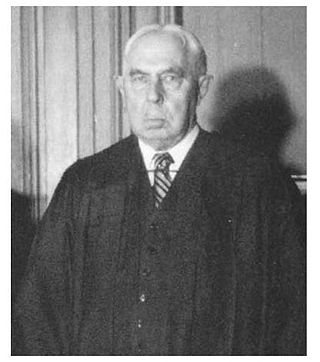Related Research Articles

Augustus Noble Hand was a United States district judge of the United States District Court for the Southern District of New York and later was a United States Circuit Judge of the United States Court of Appeals for the Second Circuit. His most notable rulings restricted the reach of obscenity statutes in the areas of literature and contraceptives. He was the older first cousin of famed judge Learned Hand,who served on both courts with his cousin during most of Augustus Hand's tenure.
The Nonintercourse Act is the collective name given to six statutes passed by the United States Congress in 1790,1793,1796,1799,1802,and 1834 to set Amerindian boundaries of reservations. The various acts were also intended to regulate commerce between settlers and the natives. The most notable provisions of the act regulate the inalienability of aboriginal title in the United States,a continuing source of litigation for almost 200 years. The prohibition on purchases of Indian lands without the approval of the federal government has its origins in the Royal Proclamation of 1763 and the Confederation Congress Proclamation of 1783.
International News Service v. Associated Press,248 U.S. 215 (1918),also known as INS v. AP or simply the INS case,is a 1918 decision of the United States Supreme Court that enunciated the misappropriation doctrine of federal intellectual property common law:a "quasi-property right" may be created against others by one's investment of effort and money in an intangible thing,such as information or a design. The doctrine is highly controversial and criticized by many legal scholars,but it has its supporters.

Marilyn Hall Patel is a former United States district judge of the United States District Court for the Northern District of California.
Toy Biz v. United States was a 2003 decision in the United States Court of International Trade that determined that for purposes of tariffs,Toy Biz's action figures were toys,not dolls,because they represented "nonhuman creatures". This decision effectively halved the tariff rate,from 12 percent tax to 6.8 percent.

Richard George Kopf is a senior United States district judge of the United States District Court for the District of Nebraska.
Jed Saul Rakoff is a senior United States district judge of the United States District Court for the Southern District of New York.

Richard Miles Berman is a senior United States district judge of the United States District Court for the Southern District of New York.
Robert David Sack is a senior United States circuit judge of the United States Court of Appeals for the Second Circuit.

Loretta A. Preska is an American lawyer who serves as a senior United States district judge of the United States District Court for the Southern District of New York. Born in Albany,Preska received law degrees from Fordham University School of Law and New York University School of Law. She practiced law in New York City from 1973 to 1992 at the law firms of Cahill Gordon &Reindel and Hertzog,Calamari &Gleason. President George H. W. Bush appointed her to the district bench in 1992. She served as chief judge of the court for a seven-year term from 2009 to 2016,and took senior status in 2017. President George W. Bush nominated Preska to the U.S. Court of Appeals for the Second Circuit in 2008,but the Senate did not act on the nomination.

Jerry Edwin Smith is an American attorney and jurist serving as a United States circuit judge of the United States Court of Appeals for the Fifth Circuit.
Long Term Capital Holdings v. United States,330 F. Supp. 2d 122,was a court case argued before the United States District Court for the District of Connecticut that concerned a tax shelter used by Long-Term Capital Management,a failed hedge fund.
Denise Louise Cote is a senior United States district judge of the United States District Court for the Southern District of New York.

Kevin Thomas Duffy was an American lawyer and United States district judge of the United States District Court for the Southern District of New York.

Ellen Judith Huvelle is an inactive Senior United States district judge of the United States District Court for the District of Columbia. She has overseen several significant cases. In a case decided in May 2001,Huvelle "upheld federal regulations that restrict the sale of consumers' names,Social Security numbers,dates of birth,addresses and phone numbers." Later that year,Huvelle heard requests by family members of Vince Foster seeking access to pictures of his body taken after his death. In November 2005,she accepted the guilty plea in the high-profile prosecution of lobbyist Michael Scanlon. Huvelle assumed senior status on June 3,2014.
Charles Proctor Sifton was a United States district judge of the United States District Court for the Eastern District of New York from 1977 to 2009 and its Chief Judge from 1995 to 2000.
Meyer v. Grant,486 U.S. 414 (1988),was an important decision by the United States Supreme Court on paid petition circulation. Colorado was one of several states with a process for citizens to propose initiatives for the ballot,which if passed became law. One of the requirements was to get the signatures of a significant number of registered Colorado electors. Colorado prohibited initiative sponsors from paying for the circulation of these petitions. The state argued this was necessary to "protect[...] the integrity of the initiative."

Mark Allen Barnett is the Chief Judge of the United States Court of International Trade.

Barclays Capital Inc. v. Theflyonthewall.com,Inc.,650 F.3d 876,was a case decided in the United States Court of Appeals for the Second Circuit where the Second Circuit,reversing the decision of the US District Court below it,found that the claims of three major financial investment firms against an internet subscription stock news service (theflyonthewall.com) for "Hot-news" Misappropriation under state common law doctrine could not stand,as they were pre-empted by several sections of the Federal Copyright Act.
Teva Pharmaceuticals USA,Inc. v. Sandoz,Inc.,574 U.S. 318 (2015),is a patent case of the Supreme Court of the United States regarding the Copaxone patent. The Court held that,when reviewing a district court’s resolution of subsidiary factual matters made in the course of its construction of a patent claim,the Federal Circuit must apply a "clear error," not a de novo,standard of review.
References
- ↑ Confirmation hearings on federal appointments: hearings before the Committee on the Judiciary, United States Senate, One Hundred Fifth Congress, first session, on confirmation of appointees to the federal judiciary. 1997. ISBN 9780160557163.
- 1 2 3 4 "Barzilay, Judith Morgenstern - Federal Judicial Center". www.fjc.gov.
- 1 2 "Judge Judith Morgenstern Barzilay (Court of International Trade) – CourtListener.com". CourtListener. Retrieved 2019-12-10.
- ↑ Biographical Directory of Federal Judges.
- ↑ Toy Biz, Inc. v. United States
- ↑ "Toy Biz, Inc. v. United States, 248 F. Supp. 2d 1234 – CourtListener.com". CourtListener. Retrieved 2019-12-10.
- ↑ "Fans Howl in Protest as Judge Decides X-Men Aren't Human - WSJ". Wall Street Journal. 20 January 2003.
- ↑ "Reference at scholarship.rollins.edu".
- ↑ 33 C.I.T. 1003, 637 F.Supp.2d 1218 (July 20, 2009)
- ↑ 33 C.I.T. 984, 637 F.Supp.2d 1199 (July 20, 2009)
- ↑ 844 F.Supp.2d 1298 (Ct. Int'l Trade April 13, 2012)
- ↑ 991 F.Supp.2d 1343 (Ct. Int'l Trade July 1, 2014)